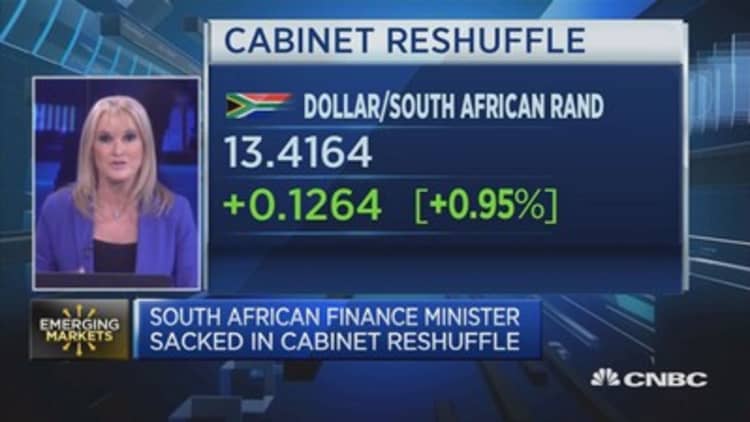South Africa's demise towards a junk credit rating looks almost inevitable after the sudden dismissal of the country's finance minister Pravin Gordhan. The currency (ZAR) plunged 5 percent.
President Jacob Zuma's move to fire Gordhan, and eight other cabinet members, threw markets into turmoil early Friday, resulting in the worst weekly depreciation of the rand since 2015. Speculation over a reshuffle was first sparked Monday when Gordhan and National Treasury Director General Lungisa Fuzile were recalled from an investor roadshow to the U.K. and the U.S.
While the market reaction was somewhat more muted compared to when finance minister Nhlanhla Musa Nene was abruptly dismissed in 2015, South Africa-exposed stocks fell into negative territory Friday, trading down between 4 and 8 percent, as they became increasingly sensitive to the probability of a credit rating downgrade.
Businesses reeling
Gordhan was largely considered a steady hand in an otherwise volatile government and had been mandated to maintain the country's credit rating.
His successor, home affairs head Malusi Gigaba, has little notable finance experience. President Zuma had signalled his intentions to shake up the cabinet ahead of his scheduled resignation later this year but it still prompted concern among the business community.

"Right now the business community is reeling, absorbing this news. Malusi Gigaba as finance minister was not a candidate that many people had thought about at all," Bronwyn Nielsen, editor-in-chief CNBC Africa said early Friday in Johannesburg.
Downgrades a 'foregone conclusion'
The timing of President Zuma's reshuffle is curious, coming one week before the country is set to receive its latest Moody's credit rating.
A downgrade of at least one notch is now certain, according to analysts who spoke to CNBC. The country's credit rating is currently only two notches away from levels that would see its local debt being excluded from the WGBI index.
"Ratings downgrades look to be a foregone conclusion, as the ratings agencies will see this as ushering in a period of protracted political instability," said Marc Ostwald, strategist at ADM Investor Services.
"I think a downgrade to below investment grade is a dead cert at this point. It is a question of when not if," added Kevin Loane, economist at Fathom Consulting.
While a downgrade may have been on the cards prior to the reshuffle, given the shifting nature of South Africa's economic and political landscape, the president's latest move underlines his disconnect with the market, which is likely to further unsettle investors.
"Zuma made a huge mistake … it shows you how he's not connected to the market," said Mike Harris, adjunct professor at Syracuse University.
Harris noted that a likely rating downgrade by Moody's next week would have given the president a "legitimate PR pretext for firing (Gordhan)," but poor economic understanding saw him miss his shot.
"Moody's is going to downgrade anyway. They probably were going to go to stable, now they might even go to negative. S&P has a very itchy finger, they've been very focused on politics, and the likelihood now that they downgrade is all the more so.
"It was very unlikely that we were going to see fore-selling of South Africa due to a move to junk this year.
"Now, it's highly probable," noted Harris.
Market outlook
As well as looking at credit rating analysis, policy developments over the coming months are likely to set the tone for the new direction of President Zuma's African National Congress (ANC) government.
This includes the Mining Charter and Mineral and Petroleum Resources Development Act (MPRDA), which are due to be presented in the next one to three months, and the ANC's late June Policy Conference or forthcoming cabinet changes, noted UBS in a press note.
"This political battle has an adverse impact on the economy, e.g. it is hardly an inducement for domestic let alone foreign investment, and also weakness in ZAR and rise in long-term interest rates may well boost inflation, in turn perhaps requiring some budget belt tightening," added Ostwald.
Gordhan brandishes dismissal as 'absolute nonsense'
Speaking for the first time about his dismissal, Gordhan told a press conference that rumours of his involvement in an alleged conspiracy to undermine the South African economy were "absolute nonsense."
"This is not the basis upon which you 'fire' or release from 'release from their responsibility', which is the more polite way of putting it, a minister of finance and a deputy minister of finance.
"If anybody wants us not to do this job, just tell us not to do this job. Nothing has to be manufactured in order to create an environment in which our integrity needs to be undermined and we need to be discredited in order to justify some objective outside of the real intent."
Gordhan also said that prior to being recalled from his investor roadshow, he has liaised with credit rating agencies Moody's, Fitch and S&P about ensuring the country maintained an "investment grade economy."


